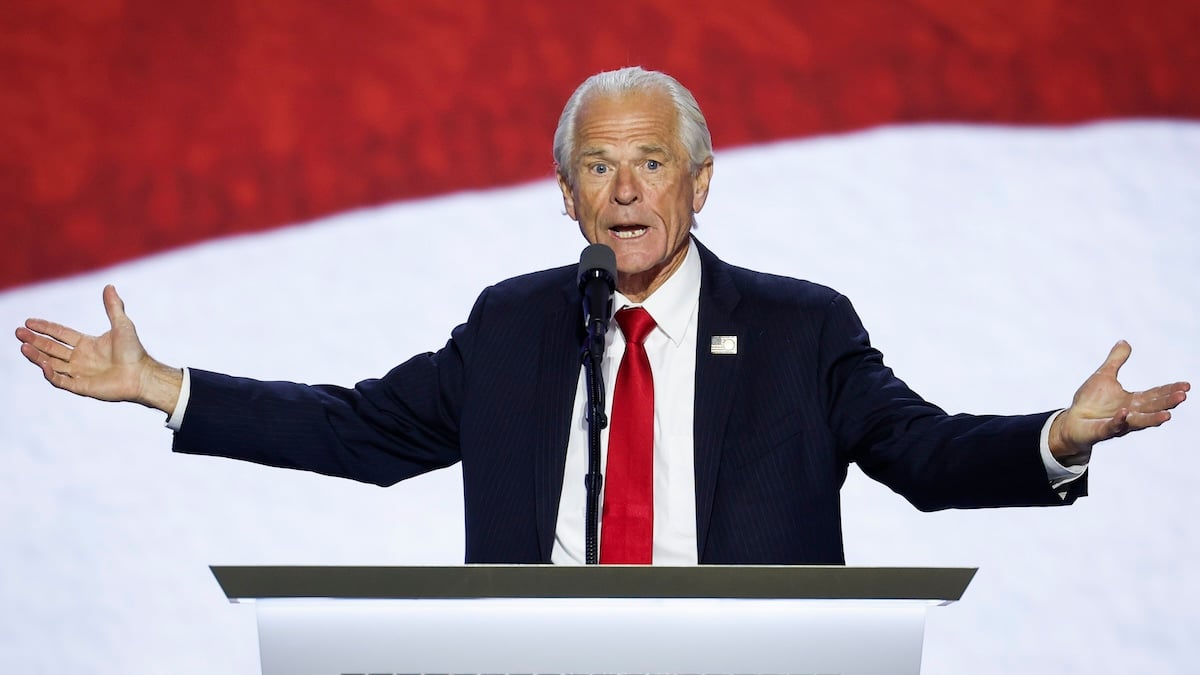During the 2024 Republican National Convention (RNC), a former Donald Trump administration official, Peter Navarro, received a hero’s welcome just hours after his release from prison.
Peter Navarro’s journey to becoming a key figure in Republican politics is as unconventional as controversial. Born in Cambridge, Massachusetts, Navarro’s academic credentials are impressive. He holds a Ph.D. in economics from Harvard University and spent years as a professor at the University of California, Irvine. However, it wasn’t his academic career that thrust him into the national spotlight.
Navarro gained attention in conservative circles through his hawkish stance on China. He authored books like Death by China and The Coming China Wars, which caught the eye of then-candidate Donald Trump. In 2016, Navarro joined the Trump campaign as an economic advisor, and when Trump won the presidency, Navarro secured a position in the White House.
What is Peter Navarro known for?
As the Director of the Office of Trade and Manufacturing Policy, Navarro became a crucial voice in shaping Trump’s trade policies, particularly regarding China. He was a strong proponent of reducing U.S. trade deficits and advocated protectionist policies. Navarro’s influence in the administration grew, especially after many free-trade proponents left the White House.
During his time in the White House, Navarro made several controversial statements. For instance, in 2018, he argued that no country would retaliate against U.S. tariffs, a quickly disproven claim when other nations implemented retaliatory tariffs. He also promoted unsubstantiated claims of election fraud following the 2020 presidential election.
Why did Peter Navarro get arrested?
Peter Navarro’s legal issues stem from his refusal to comply with a subpoena issued by the House Select Committee investigating the Jan. 6, 2021, Capitol attack. The committee sought Navarro’s testimony and documents related to his role in efforts to challenge the 2020 election results.
In September 2023, Navarro was convicted on two counts of contempt of Congress. His defense centered on claims of executive privilege, asserting that former President Trump had invoked this protection to prevent him from cooperating with the committee. However, Navarro failed to prove that Trump had asserted such privilege.
In January 2024, Judge Amit Mehta sentenced Navarro to four months in prison and imposed a $9,500 fine. This sentence was less severe than the prosecution’s request for six months in prison and a $600,000 fine. Navarro’s legal team immediately announced plans to appeal the conviction.
His attempts to delay his prison sentence reached the Supreme Court. However, Chief Justice John Roberts dismissed his plea to postpone his surrender to prison pending appeal. This decision effectively exhausted Navarro’s legal options to avoid immediate incarceration.
On March 19, 2024, Navarro began serving his four-month sentence at a federal prison in Miami. He became the first high-ranking Trump administration official to be incarcerated in connection with the Jan. 6 investigations.
What does Peter Navarro’s warm greeting at the RNC mean?
Navarro’s speech at the 2024 Republican National Convention, mere hours after his release from prison, carries several implications for the current political landscape. Navarro used his platform at the RNC to portray himself as a martyr for the Trump cause. He framed his legal troubles as political persecution, stating, “I went to prison so you wouldn’t have to.” This narrative aligns with broader Republican claims of weaponized justice against Trump allies – a farfetched idea given Trump’s recently gained retroactive immunity.
Navarro’s prominent speaking slot at the RNC, despite his recent incarceration, demonstrates the enduring influence of Trump-era officials within the Republican Party. It suggests that legal troubles may not diminish one’s standing among certain segments of the GOP base.
Navarro’s warm reception at the RNC also highlights the deep divide in how the events of Jan. 6 and subsequent investigations are perceived. While some view the legal actions against Navarro as necessary accountability, others see them as overreach. Former President Trump’s praise for Navarro’s speech and criticism of his imprisonment further solidifies the narrative of persecution among Trump supporters. The GOP candidate’s characterization of Navarro as a “great patriot” who was “treated very unfairly” reinforces this perspective.
More than a brainless manifestation of loyalty above reason, Navarro’s RNC reception also throws some shade on the GOP future. His speech, which warned of government overreach and the need for Republicans to control all branches of government, may influence party rhetoric and policy positions moving forward. Furthermore, his experience could be used to argue for limits on congressional investigative powers or changes to contempt of Congress procedures. That would be a grim outcome as democracy can only resist if those in power can be held accountable for their actions.

